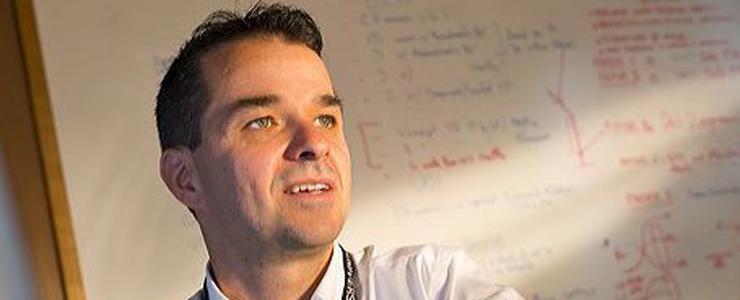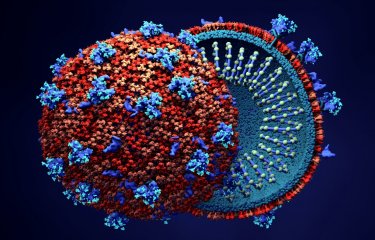Research Focuses on the Intersection of Women’s Health and the Microbiome
Jacques Ravel, PhD, Professor of Microbiology and Immunology, as well as Associate Director for Genomics at the Institute for Genome Sciences (IGS), both at the University of Maryland School of Medicine, has been named a 2015-2017 Blaise Pascal International Research Chair, one of the most prestigious European science awards. He is spending this year working at the Institut Pasteur in Paris, and over the next two years will divide his time between Paris and Baltimore.
Baltimore, Md., January 07, 2016

Dr. Ravel focuses on the human microbiome and its role in women’s health. In his research, he develops and applies modern genomic technologies and systems biology approaches to decipher the functional relationships between the human host, the microbiome and susceptibilities to obstetrics and gynecological outcomes and sexually transmitted infections. He is actively working on developing novel strategies to improve women’s health by modifying the microbiome.
“Jacques Ravel is an outstanding scientist and a creative thinker, and we are honored that he has been given this recognition,” said Claire M. Fraser, PhD, director of the IGS. “I am sure that his time at the Pasteur Institute will yield further insights into this burgeoning scientific area.”
While at the Institut Pasteur, Dr. Ravel is working with Philippe J. Sansonetti, MS, MD, Professor of Microbiology at the Institut Pasteur and the Collège de France in Paris, and a member of the U.S. National Academies of Science, and a microbiologist who is interested in intestinal pathogens. Working with Dr. Sansonetti, Dr. Ravel will address the following central question: “Can a pathogen, to be successful, become a commensal, by subverting the fine-tuned balance between the host and the microbiome?” The pair are examining how some harmful microbes find niches within hosts, and transform themselves into more “friendly” bacteria. In particular, they will try to better understand how Chlamydia, which is pathogenic in some parts of the body, can live in the gastrointestinal tract without triggering problems. The Chair Blaise Pascal is funded by the Ile-de-France region of France. Dr. Ravel will also be organizing a symposium to highlight his research work in France, and to feature global collaborators and leading scientists. The symposium will take place at the College de France, a renowned research and teaching institution established in 1530 by King François 1st.
“Being able to work at the Institut Pasteur, and with Dr. Sansonetti is a fantastic opportunity. For over 100 years, the Institute has continuously been a leader in the battle against infectious diseases,” said Dr. Ravel. “Having immersed myself in genomics over the past 15 years, the Chair Blaise Pascal is giving me a rare opportunity to re-engage myself with my original research focus in microbiology and interact with global leaders in microbiology, cell biology and immunology who are focusing on the role of the human microbiome in infectious diseases.”
The Blaise Pascal Chairs were established in 1996 to honor foreign scientists in all disciplines. The award is named for the eminent 17th-century French genius, Blaise Pascal, who was a mathematician, philosopher, inventor and physicist. Previous laureates include Gerard Debreu (1983 Nobel Prize in Economics), Ahmed Zewail (1999 Nobel Prize in Chemistry), Georges Smoot (2006 Nobel Prize in Physics), Elizabeth Blackburn (2009 Nobel Prize in Physiology or Medicine), and Michael Levitt (2013 Nobel Prize in Chemistry).
Dr. Ravel is one of two Blaise Pascal Chairs selected this year. The other is Piero Madau, PhD, a professor of astronomy at the University of California, Santa Cruz.
“Dr. Ravel fully deserves this honor for his groundbreaking work with the microbiome. It is especially exciting that this recognition is international,” says E. Albert Reece, MD, PhD, MBA, Vice President for Medical Affairs, University of Maryland, and John Z. and Akiko K. Bowers Distinguished Professor and Dean, University of Maryland School of Medicine. “This highlights a broader point, that many of our scientists are working across borders, with colleagues in other countries. The nature of science and medicine is truly international.”
About the Institute for Genome Sciences
The Institute for Genome Sciences, founded in 2007, is an international research center within the University of Maryland School of Medicine. Comprised of an interdisciplinary, multidepartment team of investigators, the Institute uses the powerful tools of genomics and bioinformatics to understand genome function in health and disease, to study molecular and cellular networks in a variety of model systems, and to generate data and bioinformatics resources of value to the international scientific community.
www.igs.umaryland.edu
About the University of Maryland School of Medicine
The University of Maryland School of Medicine was chartered in 1807 and is the first public medical school in the United States and continues today as an innovative leader in accelerating innovation and discovery in medicine. The School of Medicine is the founding school of the University of Maryland and is an integral part of the 11-campus University System of Maryland. Located on the University of Maryland’s Baltimore campus, the School of Medicine works closely with the University of Maryland Medical Center and Medical System to provide a research-intensive, academic and clinically based education. With 43 academic departments, centers and institutes, and a faculty of more than 3,000 physicians and research scientists and more than $400 million in extramural funding, the School is regarded as one of the leading biomedical research institutions in the U.S. with top-tier faculty and programs in cancer, brain science, surgery and transplantation, trauma and emergency medicine, vaccine development and human genomics, among other centers of excellence. The School is not only concerned with the health of the citizens of Maryland and the nation, but also has a global presence, with research and treatment facilities in more than 35 countries around the world.
www.medschool.umaryland.edu
About the Institut Pasteur
The Institut Pasteur, a private foundation with officially recognized charitable status set up by Louis Pasteur in 1887, is today an internationally renowned center for biomedical research with a network of 33 institutes worldwide. In the pursuit of its mission to prevent and fight against diseases in France and throughout the world, the Institut Pasteur operates in four main areas: scientific and medical research, public health and health monitoring, teaching, and business development and technology transfer.
More than 2,400 people work on its Paris campus. The Institut Pasteur is a globally recognized leader in infectious diseases, microbiology, and immunology. Its 130 units also focus their research on certain cancers, genetic and neurodegenerative diseases, genomics and developmental biology. This research aims to expand our knowledge of living organisms in a bid to lay the foundation for new prevention strategies and novel therapeutics. Since its inception, 10 Institut Pasteur scientists have been awarded the Nobel Prize for Medicine, including two in 2008 for the 1983 discovery of the human immunodeficiency virus (HIV) that causes AIDS.
About the Blaise Pascal International Research Chairs
Blaise Pascal International Research Chairs were created in France by the State and the Ile-de-France Region. Each chair allows a foreign scientist of very high level, internationally recognized and in all disciplines, to continue his or her work as a project scientist for 12 months possibly spread over 2 years, sometimes accompanied by other researchers in an institution of higher education or research in Paris/Ile-de-France. Management of these chairs is entrusted to the Foundation of the Ecole normale supérieure. A Scientific Council annually selects candidates. The Blaise Pascal Chairs have become famous worldwilde and within the scientific community.





